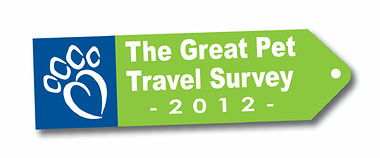Companion Care Vets And The University Of Bristol Launch The Great Pet Travel Survey 2012
 14 years ago
14 years ago  2508 views
2508 views
Posted
17th April, 2012 11h15
 Enabling quantitative assessment of disease risks to UK following simplification of Pet Travel Scheme rules
Amid the current debate and wide-spread concern shared by veterinary professionals and politicians about changes to Pet Travel Rules, Companion Care Vets and a team at the University of Bristol have announced the launch of The Great Pet Travel Survey 2012, which will collect and analyse information about the travel patterns of UK resident dogs, in and around mainland Europe, over the last decade.
The simplification of the Pet Travel Scheme rules for re-entry of pets into the UK, which came into force at the beginning of 2012, has brought a key question to mind - what risks do these changes pose to the health of the human and dog population in the UK?
Robert White-Adams, Vet from Companion Care says, “At present there is minimal data available to answer this question as current data logging is minimal and paperwork checking at ports can be variable. We therefore have little idea of how many UK-resident dogs travel aboard, where they visit, how long they stay and what they are doing whilst abroad.”
“The data to be collated by the survey will fill this data void and enable us to provide a quantitative assessment of the disease risk, as well as gaining an understanding of owner awareness of risks face by dogs travelling in Europe.”
"A partnership led by Robert White-Adams and Dr Eric Morgan, Senior Lecturer, School of Biological Sciences at the University of Bristol, has developed the questionnaire to provide much needed data on this issue."
Owners of dogs with Pet Passports are being encouraged to fill in the short questionnaire, which is available now at http://www.greatpetsurvey.co.uk. All completed questionnaires will be entered into a prize draw to win £100 of Pets at Home vouchers!
The questionnaire will be live online until 30th June 2012 and all data will be analysed by the University of Bristol.
Dr Morgan concludes, “Without this information we have only a vague idea of the risks that the loss of border controls may pose. The answer could be that there is little additional risk or it could be that the UK dog (and human) population could face some severe disease threats. As it stands now, we just don’t know enough to make an informed judgement.”
Enabling quantitative assessment of disease risks to UK following simplification of Pet Travel Scheme rules
Amid the current debate and wide-spread concern shared by veterinary professionals and politicians about changes to Pet Travel Rules, Companion Care Vets and a team at the University of Bristol have announced the launch of The Great Pet Travel Survey 2012, which will collect and analyse information about the travel patterns of UK resident dogs, in and around mainland Europe, over the last decade.
The simplification of the Pet Travel Scheme rules for re-entry of pets into the UK, which came into force at the beginning of 2012, has brought a key question to mind - what risks do these changes pose to the health of the human and dog population in the UK?
Robert White-Adams, Vet from Companion Care says, “At present there is minimal data available to answer this question as current data logging is minimal and paperwork checking at ports can be variable. We therefore have little idea of how many UK-resident dogs travel aboard, where they visit, how long they stay and what they are doing whilst abroad.”
“The data to be collated by the survey will fill this data void and enable us to provide a quantitative assessment of the disease risk, as well as gaining an understanding of owner awareness of risks face by dogs travelling in Europe.”
"A partnership led by Robert White-Adams and Dr Eric Morgan, Senior Lecturer, School of Biological Sciences at the University of Bristol, has developed the questionnaire to provide much needed data on this issue."
Owners of dogs with Pet Passports are being encouraged to fill in the short questionnaire, which is available now at http://www.greatpetsurvey.co.uk. All completed questionnaires will be entered into a prize draw to win £100 of Pets at Home vouchers!
The questionnaire will be live online until 30th June 2012 and all data will be analysed by the University of Bristol.
Dr Morgan concludes, “Without this information we have only a vague idea of the risks that the loss of border controls may pose. The answer could be that there is little additional risk or it could be that the UK dog (and human) population could face some severe disease threats. As it stands now, we just don’t know enough to make an informed judgement.”More from
- Animus launches SkinBond Multi for enhanced wound care
- IVC Evidensia reports 82% cut in Farm antibiotic use and 20% carbon emissions reduction
- Vet professionals flock to sign up to transformative locum platform
- The ProSalus Foundation launches urgent appeal for UK vets to support Ukrainian colleagues
- Vetsure Named Business of the Year at 2025 SME National Business Awards


 18 minutes ago
18 minutes ago